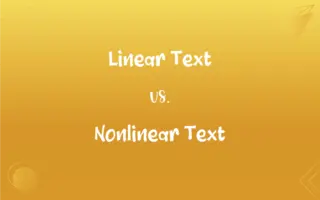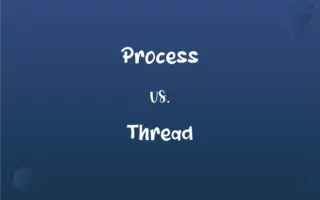ASP.NET vs. VB.NET: What's the Difference?
Edited by Aimie Carlson || By Janet White || Published on February 18, 2024
ASP.NET is a web framework for building web applications, while VB.NET is a programming language used for a variety of applications.

Key Differences
ASP.NET and VB.NET are both key components of Microsoft's .NET framework but serve different purposes. ASP.NET is a server-side web application framework designed for web development to produce dynamic web pages. It allows developers to build web applications in a simplified manner. On the other hand, VB.NET, short for Visual Basic .NET, is a multi-paradigm, object-oriented programming language, providing a simple syntax that is easy to learn for beginners. VB.NET is not limited to web development and can be used for a wide range of applications, including desktop and mobile applications.
In terms of usage, ASP.NET is heavily focused on web-based applications, leveraging tools and libraries specifically designed for building robust, scalable web applications and services. It supports various web development models, including Web Forms, MVC (Model View Controller), and Web API. Conversely, VB.NET is a versatile language that can be used across different types of applications, not just web-based ones. It offers a comprehensive set of libraries and a runtime environment for building high-performance applications on the .NET framework.
When considering the developer community and support, ASP.NET has a strong following among web developers, particularly those who work on enterprise-level applications. It is often chosen for its ability to integrate seamlessly with other Microsoft services and its robust security features. VB.NET, while having a strong historical presence, particularly among developers transitioning from the older Visual Basic 6, is now considered less popular compared to more modern languages like C#. However, it remains a viable choice due to its simplicity and the extensive support provided by Microsoft.
From a technical perspective, ASP.NET and VB.NET differ in their core functionalities. ASP.NET is more about a framework providing a structured way to build web applications, with features like session management, authentication, and data binding. VB.NET’s strength lies in its language features like easy-to-read syntax, automatic garbage collection, and strong integration with the Windows platform. It can be used within ASP.NET for programming logic but is also capable of much more in standalone applications.
ASP.NET and VB.NET are both part of the larger .NET ecosystem, they cater to different aspects of software development. ASP.NET is a specialized tool for web development, offering a robust and scalable way to build web applications. VB.NET, as a programming language, offers a broader range of application possibilities, extending beyond web development to include desktop, mobile, and even game development. Their coexistence in the .NET framework allows developers to leverage the strengths of each in building comprehensive and versatile applications.
ADVERTISEMENT
Comparison Chart
Primary Use
Building web applications and services
General programming including desktop, web, and mobile apps
Language Type
Framework, not a language
Object-oriented programming language
Syntax
Uses languages like C# or VB.NET
Simple, beginner-friendly syntax
Development Focus
Web-centric development
Broad application development
Community and Ecosystem
Strong in enterprise web development
Popular among those transitioning from older VB versions
ADVERTISEMENT
ASP.NET and VB.NET Definitions
ASP.NET
ASP.NET is a web application framework developed by Microsoft.
Our company's website was efficiently built using ASP.NET.
VB.NET
VB.NET is part of the .NET framework, allowing for versatile application development.
Our latest software tool was developed in VB.NET due to its flexibility and framework support.
ASP.NET
ASP.NET offers features like authentication, session management, and caching.
The secure login system of our web application was built using ASP.NET's authentication features.
VB.NET
VB.NET is an object-oriented programming language developed by Microsoft.
I wrote a desktop application using VB.NET for its easy syntax.
ASP.NET
ASP.NET allows developers to create dynamic web pages and web services.
The new e-commerce platform uses ASP.NET for its dynamic product pages.
VB.NET
VB.NET supports both console and GUI-based applications.
We created a user-friendly graphical interface for our app using VB.NET.
ASP.NET
ASP.NET supports MVC (Model-View-Controller) architecture.
We implemented the MVC pattern in our web application using ASP.NET.
VB.NET
VB.NET allows for rapid application development.
We quickly developed a prototype of our application using VB.NET's rapid development capabilities.
ASP.NET
ASP.NET integrates seamlessly with other Microsoft technologies.
Integrating our ASP.NET web app with Microsoft Azure services enhanced its functionality.
VB.NET
VB.NET is known for its simple, readable syntax.
Transitioning to VB.NET was easy due to its straightforward and readable code structure.
FAQs
Is VB.NET a language or a framework?
VB.NET is a programming language, part of the .NET framework.
What is the primary advantage of using VB.NET?
VB.NET offers a simple, readable syntax and is versatile for various types of application development.
What are the key features of ASP.NET?
Key features include MVC architecture, server-side scripting, and integration with Microsoft technologies.
Can VB.NET be used for mobile app development?
Yes, VB.NET can be used for mobile app development, often in conjunction with frameworks like Xamarin.
Is VB.NET still relevant in modern development?
Yes, VB.NET remains relevant for certain types of development, particularly for those who prefer its syntax or are working on legacy systems.
What is ASP.NET used for?
ASP.NET is used for building dynamic web applications and services.
Can VB.NET be used with ASP.NET?
Yes, VB.NET can be used as a programming language within ASP.NET.
Can VB.NET be used for game development?
While not common, VB.NET can be used for game development, especially for simple 2D games or learning purposes.
What types of applications are best suited for ASP.NET?
ASP.NET is best suited for enterprise-level web applications, particularly those that require scalability, security, and integration with other Microsoft services.
Does ASP.NET support RESTful services?
Yes, ASP.NET supports the creation of RESTful services, particularly through its Web API framework.
What is the learning curve for ASP.NET?
The learning curve for ASP.NET can be steep, especially for those new to web development and Microsoft's ecosystem.
Does VB.NET support object-oriented programming?
Yes, VB.NET fully supports object-oriented programming, including inheritance, encapsulation, and polymorphism.
Is VB.NET compatible with the .NET Core framework?
VB.NET is compatible with the .NET Core framework, allowing for cross-platform development.
Can VB.NET be used for desktop application development?
Yes, VB.NET is frequently used for developing Windows desktop applications, utilizing Windows Forms or WPF.
Is ASP.NET only for web development?
Yes, ASP.NET is specifically designed for building web applications and services.
What databases can ASP.NET connect with?
ASP.NET can connect with various databases, including SQL Server, MySQL, and Oracle.
Is VB.NET suitable for beginners?
Yes, VB.NET is considered beginner-friendly due to its straightforward syntax.
Can ASP.NET applications run on Linux?
With the introduction of NET Core, ASP.NET applications can now be developed and run on Linux environments.
How does ASP.NET compare with other web frameworks?
ASP.NET is often compared with frameworks like PHP, Ruby on Rails, and Django, with its main strength being seamless integration with other Microsoft products.
How does ASP.NET handle security?
ASP.NET provides built-in security features like authentication, authorization, and data protection.
About Author
Written by
Janet WhiteJanet White has been an esteemed writer and blogger for Difference Wiki. Holding a Master's degree in Science and Medical Journalism from the prestigious Boston University, she has consistently demonstrated her expertise and passion for her field. When she's not immersed in her work, Janet relishes her time exercising, delving into a good book, and cherishing moments with friends and family.
Edited by
Aimie CarlsonAimie Carlson, holding a master's degree in English literature, is a fervent English language enthusiast. She lends her writing talents to Difference Wiki, a prominent website that specializes in comparisons, offering readers insightful analyses that both captivate and inform.







































































